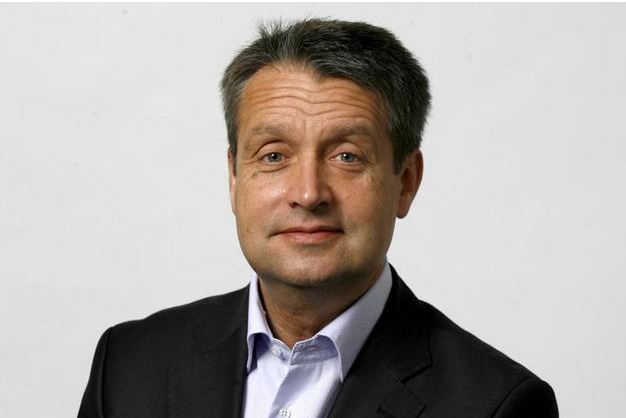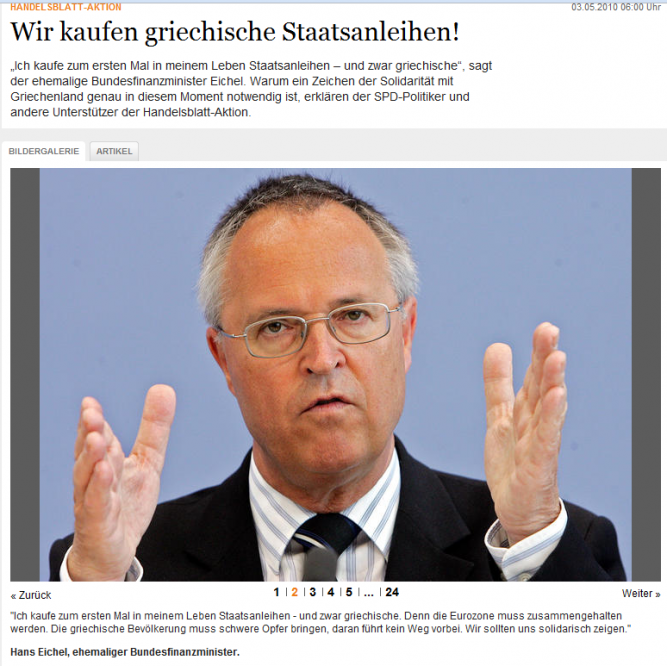May 3, 2010. The EU and the IMF have just announced a EUR 110bn bail-out for Greece. Greek 10-year government bonds are yielding below 9%. German financial newspaper “Handelsblatt” launches a multi-page call to lure unsuspecting citizens into buying Greek government bonds. You can (and should) still read this master piece here. Gabor Steingart, editor-in-chief, opens the indecent proposal with the following words (my translation from German):
“As the largest financial newspaper in the Euro region, Handelsblatt wants to be a voice of reason during these turbulent times. (…) The Greeks are sinners, but they are repentant sinners. The rescue package agreed on by the international community this weekend takes this into account. However, governments alone cannot save Greece. A stabilization can only be achieved if Greece can access capital markets. What is needed is a contribution of major banks. What is also needed is a sign of trust by the citizens of Europe. This is the purpose of our action call “I am buying Greek government bonds”. Last Friday, as a sign of responsibility, I have ordered EUR 5,000 Greek government bonds.”
 Gabor Steingart, Editor-in-chief, Handelsblatt
Gabor Steingart, Editor-in-chief, Handelsblatt
Picture: Handelsblatt
What follows is a parade of German dignities. First to praise the virtues of Greek government bonds is Hans Eichel, former German Finance Minister:
Hans Eichel, former German Finance Minister
Picture: Handelsblatt
“For the first time in my life I am buying government bonds – Greek government bonds! Because we have to keep the Euro-zone together. The Greek population has to bring great sacrifices, there is no way around that. But we should show our solidarity.”
Handelsblatt must have summoned every single pied piper available over that weekend (or was it the other way ‘round – was Handelsblatt summoned by the pied pipers?). Eichels virginal foray into government bonds is seconded by Bert Ruerup, former government advisor (“I have bought Greek government bonds at the beginning of the year and will continue to do so”), Gustav Horn, Director IMK Institute for Macro-economic Research (“I bought Greek government bonds since I can’t leave our currency’s fate in the hand of speculators”) and Wolfgang Kirsch, CEO DZ Bank (“I own Greek government bonds because I believe in the idea of a unified Europe”).
Manfred Lahnstein, former Finance Minister, felt like he had to lean out of the window a little bit further:
Manfred Lahnstein, former German finance minister
Picture: Handelsblatt
“I am ready to buy a reasonable amount of Greek government bonds. I am doing this because I have confidence in the creditworthiness of Greece and the strength of European and international guarantees. I am doing so in order to also set a small sign against arrogance and thoughtlessness our Greek partners are treated with by parts of politics and media.”
My condolences go out to Werner Bahlsen, CEO of Bahlsen GmbH (“Today I bought Greek government bonds for EUR 100,000”). Not because of his reasoning (“we must not leave the country to speculators!”) but because of all the Choco Leibnitz I would have bought with that money.
Werner Bahlsen, CEO Bahlsen GmbH
Picture: Handelsblatt
Deputy editor-in-chief Peter Brors gives free advice as he specifically addresses the retail investor reluctant to fall for the scam:
“Greek government bonds for you as a private individual? Yes, of course! EUR 2,500 for Athens and a first-class yield for me.”
 Peter Brors, deputy editor-in-chief, Handelsblatt
Peter Brors, deputy editor-in-chief, Handelsblatt
Picture: Handelsblatt
I am going to spare readers the embarrassing statements by the rest of the 20+ celebrities. Remarkably, the only sane person in the asylum seems to be troll-like Hans-Werner Sinn, head of IFO Institute for Economic Research:
“It’s okay to be partial for Greece. But I cannot recommend buying Greek government bonds in good conscience. Instead, I would recommend vacationing in Greece. That way, you know you’ll get something in return for your money.”
Hans-Werner Sinn, IFO Institute
Picture: Handelsblatt
If Greek government bonds were so attractive at 9% yields (and a national duty for Germans to pile into), where is the call to gobble up those gems now at 17%?
Somehow I am not holding my breath for Handelsblatt to revisit this blatant display of licking their advertisers’ boots (banks, insurance companies, consultancies). Usually, advertisements are marked as such. Cigarette companies have to display prominent health warnings on their products (“Smoking kills”). Next time, Handelsblatt should label each page accordingly: “Following the investment advice of these politicians and bankers might kill your performance”.
One last thing that makes me scratch my head. The online version of this Handelsblatt “advertisement” is date stamped May 3, 2010 at 6am. That was a Monday. Details of the EUR 110bn rescue package for Greece began to transpire on Sunday afternoon New York time – bed time in Europe. You can’t tell me that Handelsblatt woke up 20 VIP’s in the middle of the night to get their statement on Greek government bonds. Possibly the story was put together at an earlier date, and they decided this was the moment to let it rip. But who could have been sure Greece would be rescued? Who would have vowed with his own money for Greek government bonds?
This does not shed a good light on Handelsblatt (or the “rope team” behind it). For decent reporting on the Euro crisis one has to consider the Financial Times (Martin Wolf, Wolfgang Muenchau) or the Telegraph (Ambrose Evans-Pritchard). Unfortunately his excellent reporting ended abruptly as “AEP” has vanished more than two months ago. Upon inquiry an “Editorial Information Executive” responded “Ambrose is traveling around the Mayan uplands” for an unknown time frame. Weird.






2 responses to “Looking back: “We are buying Greek government bonds!””
[…] those who remember, Sinn was the only one among 20 German luminaries who refused to recommend buying Greek government […]
[…] those who remember, Sinn was the only one among 20 German luminaries who refused to recommend buying Greek government […]